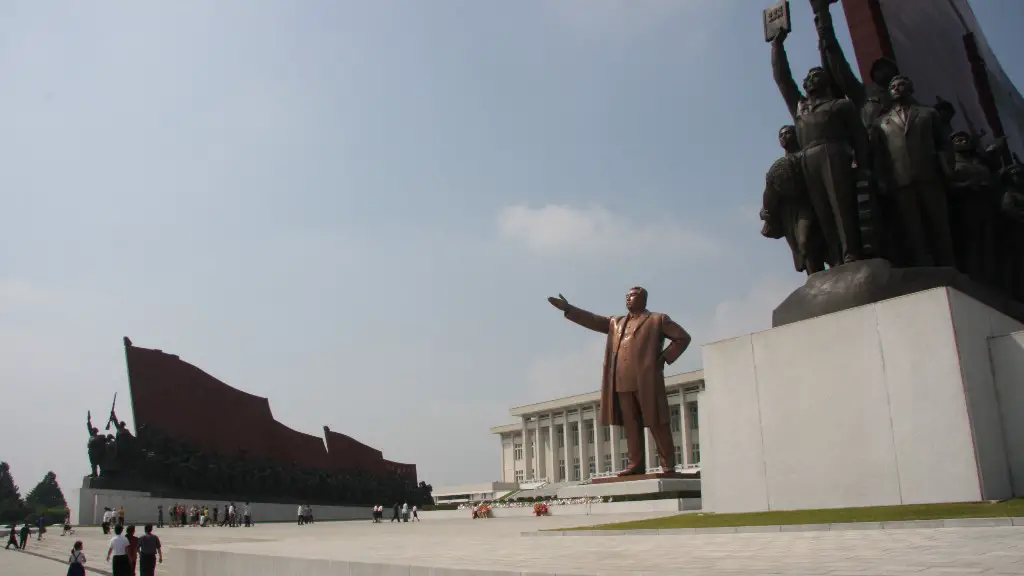Today, South Korea and North Korea are two of the most prominent countries in the world. They are geographically close and culturally similar; however, the two countries are still separated by the Korean Demilitarized Zone (DMZ) and remain enemies to this day. This article will discuss the history of why South Korea and North Korea are enemies, the current state of relations between the two countries, and the potential for peace and reconciliation.
The current enmity between South Korea and North Korea has its origins in the mid-twentieth century. Following the end of World War II, the Korean peninsula was divided into Soviet-backed North Korea and U.S.-backed South Korea. A civil war in 1950-1953 resulted in a stalemate and the two countries have been divided ever since. North Korea has remained isolated from the rest of the world, developing its own unique ideology of juche, a mix of Marxism and Korean nationalism, and becoming a nuclear power. South Korea, on the other hand, has greatly modernized and become an economic powerhouse.
The constant political and military tensions between the two countries have been exacerbated by the different ideologies that the two countries hold. South Korea’s democracy and capitalist economic system stand in stark contrast to North Korea’s authoritarianism and Communist economic system. The two countries also have different views on a number of issues, including the reunification of the Korean peninsula and the denuclearization of the Korean peninsula. These issues have in turn led to a lack of trust and animosity between the two countries.
In recent years, however, there has been some progress in the relations between South Korea and North Korea. In 2018, for example, the two countries met for a historic summit in the DMZ and agreed to work towards improved relations. These meetings have been followed by a number of small steps, including military talks and economic exchanges. However, a full reconciliation between the two countries still seems distant.
One potential path to make progress on this issue is to focus on the individual level. South Koreans and North Koreans have faced each other as enemies for decades, but there still is a shared history and culture between the two peoples. For example, the South Korean government has allowed certain North Korean defectors to enter the country to reunite with family members. This type of people-to-people contact can be used to build bridges and create an atmosphere of understanding between the two countries.
At the same time, it is also important to continue to strive towards diplomacy at the government level. In particular, South Korea and North Korea should explore ways to increase dialogue and understanding between the two countries, such as engaging in economic talks, allowing more people-to-people contact, and exploring ways of reunifying the two countries. In addition, the international community, including the United Nations, should continue to push for dialogue and a reduction of military tensions on the Korean peninsula.
Analyzing the Conflict
The ongoing conflict between South Korea and North Korea is complex and has its roots in decades of political and military tensions, ideological divides, and mistrust. In order to address the conflict, it is important to understand the underlying issues and to identify ways to reduce the tensions between the two countries and build trust. This can include exploring diplomatic solutions at both the government and individual levels, and engaging in dialogue to discuss potential solutions.
Political Situations
Politically, North Korea has maintained its isolation, rejecting many of the freedoms afforded by modern democracies, while South Korea has pursued greater openness and economic reform. This has led to starkly different political, economic, and social environments between the two countries. This difference, in turn, has only increased the mistrust between the two countries. In order to build bridges between the two countries, the two countries must work to better understand each other’s respective political systems, and to build trust and understanding.
Regional Factors
The two countries are also located in a strategically important region, with the United States and China playing significant roles in the region. This has led to uncertainties in the region that have affected the relationship between North and South Korea. In order to improve the situation, it is important to consider the regional geopolitical context and to take measures to foster dialogue and cooperation within the region.
Reunification Possibilities
Given the current political, economic, and ideological divisions between the two countries, it appears unlikely that any formal reunification effort will be successful in the near future. However, it is still possible for the two countries to work together to reduce the tensions between the two countries and to build bridges and mutual understanding. This can include exploring areas of cooperation, such as economic exchanges, and addressing the root causes of the conflict, such as education reform and economic development.
Future Outlook
Ultimately, the future of the conflict between South Korea and North Korea remains uncertain. It is clear that a complete and permanent resolution is still far off, but there is potential for progress and reconciliation. To achieve this, however, both sides must continue to work towards understanding and to explore diplomatic solutions. In addition, the international community must continue to invest in the peace process and to encourage dialogue between the two countries.


